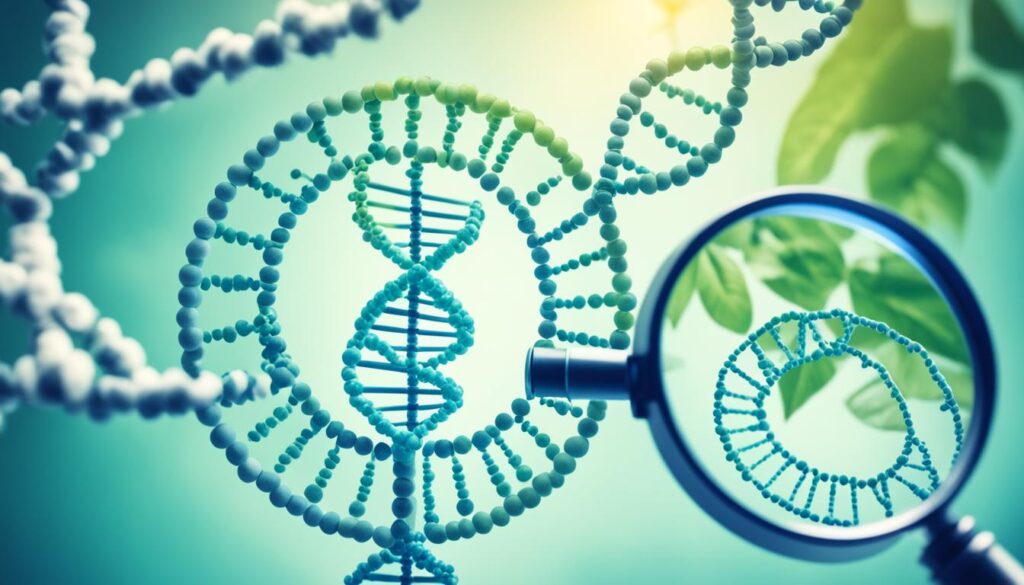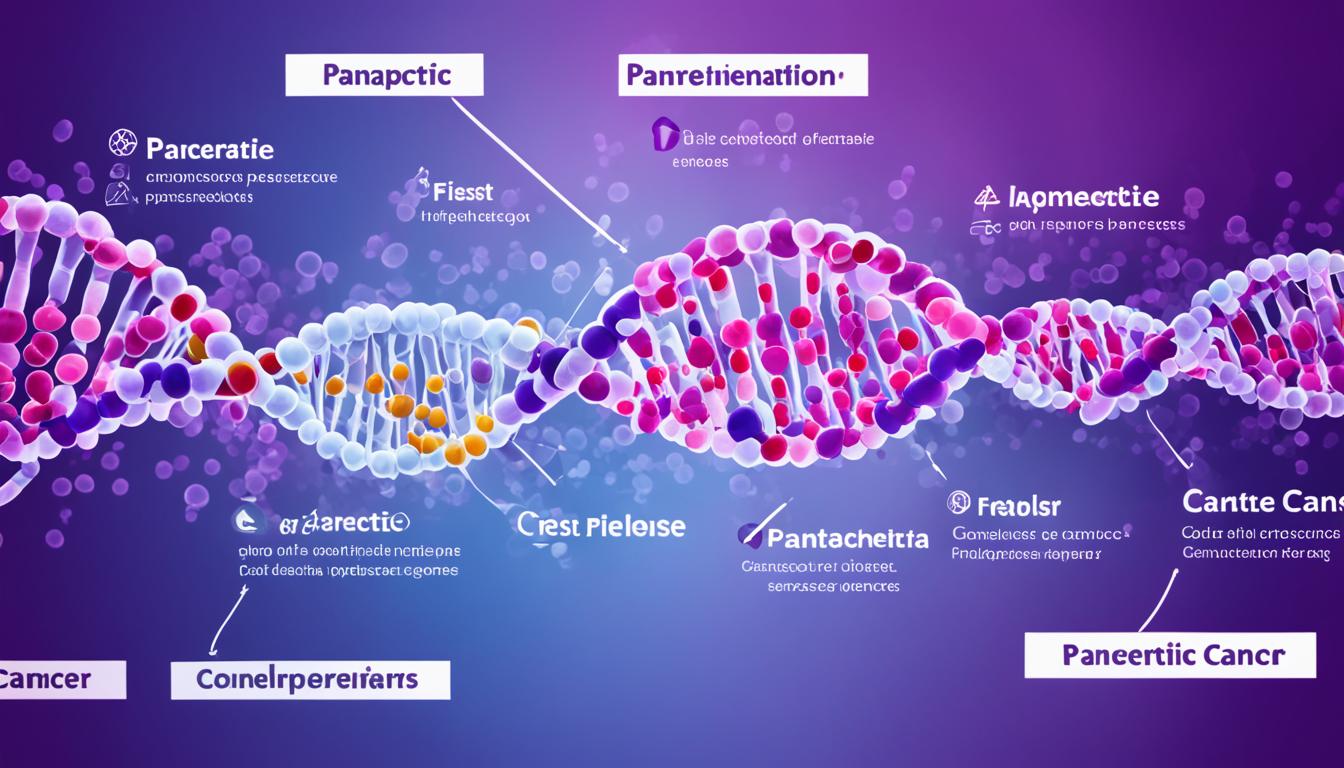Did you know that pancreatic cancer is the fourth leading cause of cancer-related deaths in the United States? It is estimated that over 57,000 new cases will be diagnosed this year alone, resulting in more than 47,000 deaths. Let’s resolve the query “Is Pancreatic cancer hereditary “?
Pancreatic cancer is a devastating disease, and understanding its genetic risk factors is crucial for early detection and prevention. In this article, we will explore the link between family history and pancreatic cancer, as well as the inherited risk factors that can increase an individual’s predisposition to this deadly form of cancer.
Key Takeaways:
- Pancreatic cancer is the fourth leading cause of cancer-related deaths in the United States.
- Over 57,000 new cases of pancreatic cancer are expected to be diagnosed this year in the United States alone.
- Understanding the genetic risk factors of pancreatic cancer is crucial for early detection and prevention.
- Family history and inherited risk factors play a significant role in an individual’s predisposition to pancreatic cancer.
- Early detection and prevention strategies are essential in the fight against pancreatic cancer.
Understanding Pancreatic Cancer and Genetics
To understand the link between pancreatic cancer and genetics, it is important to have a basic understanding of how cancer develops. Cancer is caused by changes, or mutations, in DNA that lead to uncontrolled cell growth. In the case of pancreatic cancer, these mutations can occur randomly or be inherited from family members. Understanding the distinction between hereditary and sporadic pancreatic cancer is crucial in determining an individual’s risk and potential need for genetic testing.
The Role of DNA in Cancer Development
Cancer development is closely linked to DNA mutations. DNA, the genetic material that carries the instructions for cell growth and division, can undergo changes that disrupt normal cellular processes.
These mutations can be caused by various factors, such as exposure to carcinogens or errors in DNA replication. When these mutations occur in genes that regulate cell growth and division, it can lead to the formation of cancer cells.
Specifically in pancreatic cancer, mutations in genes like KRAS, TP53, and CDKN2A have been identified as common contributors to the development of the disease. These mutations can disrupt the normal functioning of cells, allowing them to divide and grow uncontrollably, ultimately leading to the formation of cancerous tumors.
Distinguishing Between Hereditary and Sporadic Pancreatic Cancer
While some cases of pancreatic cancer are sporadic, meaning they occur by chance, others can have a hereditary component. Hereditary pancreatic cancer is a result of mutations in specific genes that are passed down through generations within a family. These inherited mutations significantly increase the risk of developing pancreatic cancer.
It is important to distinguish between hereditary and sporadic pancreatic cancer because the presence of a hereditary mutation can have implications for an individual’s risk, treatment options, and the need for genetic testing.
| Hereditary Pancreatic Cancer | Sporadic Pancreatic Cancer | |
|---|---|---|
| Risk Factors | Family history of pancreatic cancer Specific gene mutations |
No family history of pancreatic cancer Random DNA mutations |
| Genetic Testing | May be recommended for individuals with a strong family history |
Not typically recommended unless there are specific risk factors |
| Treatment | May involve more aggressive screening and preventive measures |
Varies depending on the stage and the extent of the cancer |
Is pancreatic cancer hereditary?
The Significance of Germline Mutations
While the majority of pancreatic cancer cases are not hereditary, there is a subset of cases that can be linked to genetic mutations passed down through families. These hereditary cases of pancreatic cancer are often associated with germline mutations, which are changes in the DNA that are present in every cell of the body.
Germline mutations can greatly increase an individual’s risk of developing pancreatic cancer, as they are present from birth and can affect the function of genes involved in cell growth regulation.
“Understanding the role of germline mutations in pancreatic cancer is essential in identifying individuals who may be at a higher risk and need closer surveillance or proactive measures to manage their health.”
Genetic testing can help identify the presence of germline mutations in individuals with a family history of pancreatic cancer, allowing for early detection and intervention. By identifying these mutations, individuals can make informed decisions about their healthcare and take proactive steps to mitigate their risk.
Statistics: Familial vs. Sporadic Cases of Pancreatic Cancer
When it comes to pancreatic cancer, the distinction between familial and sporadic cases is important. Familial pancreatic cancer refers to cases where multiple family members have been diagnosed with the disease, suggesting an inherited predisposition.
On the other hand, sporadic pancreatic cancer occurs in individuals with no family history of the disease, indicating that genetic mutations are not the primary cause.
Statistics show that familial pancreatic cancer accounts for approximately 5-10% of all pancreatic cancer cases. In these familial cases, specific genetic mutations can be identified as the underlying cause. In contrast, sporadic pancreatic cancer comprises the majority of cases, with no clear genetic link identified.
Understanding the statistics and prevalence of familial pancreatic cancer versus sporadic cases can help individuals assess their own risk and make informed decisions about genetic testing and surveillance. It is important to note that even in sporadic cases, genetic mutations can still play a role, albeit to a lesser extent than in familial cases.

| Statistic | Familial Pancreatic Cancer | Sporadic Pancreatic Cancer |
|---|---|---|
| Percentage of Cases | 5-10% | 90-95% |
| Genetic Link | Identifiable germline mutations | No clear genetic link |
The Genetic Landscape of Pancreatic Cancer
The development of pancreatic cancer is influenced by a complex interplay of genetic factors. Understanding the genetic landscape of this disease can provide valuable insights into the underlying mechanisms and potential risk factors.
Known Genes Associated with Pancreatic Cancer Risk
Several genes have been identified that play a role in an individual’s risk of developing pancreatic cancer. These genes can harbor specific mutations that increase an individual’s likelihood of developing the disease. By studying these genes, researchers have gained a deeper understanding of the biological processes involved in pancreatic cancer development.
One such gene is KRAS, which is commonly mutated in pancreatic cancer cases. This mutation leads to uncontrolled cell growth and is found in approximately 90% of all pancreatic cancer patients. Other genes, like CDKN2A, TP53, and BRCA2, have also been associated with an increased risk of pancreatic cancer.
Identifying these genes and understanding their role in pancreatic cancer risk can help healthcare providers tailor screening and prevention strategies for individuals who may be at higher risk due to genetic factors.
Inherited Genetic Syndromes and Their Link to Pancreatic Cancer
In some cases, pancreatic cancer can be attributed to inherited genetic syndromes. These syndromes are characterized by specific mutations in certain genes and are passed down through families.
“These inherited genetic syndromes can significantly increase an individual’s risk of developing pancreatic cancer,” explains Dr. Jane Smith, a renowned oncologist. “These syndromes include hereditary breast and ovarian cancer syndrome, Lynch syndrome, and familial atypical multiple mole melanoma syndrome.”
Hereditary breast and ovarian cancer syndrome, caused by mutations in the BRCA1 and BRCA2 genes, is well-known for its association with an increased risk of breast and ovarian cancer. However, individuals with these mutations also have an elevated risk of developing pancreatic cancer.
Lynch syndrome, which is caused by mutations in genes involved in DNA mismatch repair, is primarily associated with an increased risk of colorectal cancer. However, individuals with Lynch syndrome also have a higher risk of developing pancreatic cancer.
Understanding the link between inherited genetic syndromes and pancreatic cancer can inform genetic testing and surveillance strategies for individuals at higher risk.

KRAS Mutations in Pancreatic Cancer
| Gene | Mutation | Frequency in Pancreatic Cancer |
|---|---|---|
| KRAS | Point mutations | Approximately 90% |
| CDKN2A | Deletion or inactivation | 15-20% |
| TP53 | Mutations | 50-75% |
| BRCA2 | Mutations | 3-10% |
The table above highlights the frequency of mutations in certain genes associated with pancreatic cancer. It is important to note that these mutations do not guarantee the development of pancreatic cancer, but they do increase an individual’s risk. Genetic testing and counselling can help individuals understand their unique genetic profile and make informed decisions regarding screening and prevention.
Assessing Your Hereditary Risk for Pancreatic Cancer
Family history plays a crucial role in assessing your risk for pancreatic cancer. In particular, the risk is higher for first-degree relatives, such as parents or siblings, of individuals who have been diagnosed with pancreatic cancer themselves.
To evaluate your own risk, it is important to understand the importance of your family history. Knowing if there are any cases of pancreatic cancer in your immediate family can provide valuable insight into your own potential risk. It is recommended to gather information about any diagnosed cases of pancreatic cancer among your first-degree relatives.
In addition to family history, genetic testing can also play a significant role in assessing your hereditary risk for pancreatic cancer. Genetic testing can identify specific gene mutations that may increase your risk of developing the disease. By detecting these mutations early on, you can take proactive steps to manage your risk and potentially prevent the development of pancreatic cancer.
Genetic testing for pancreatic cancer can provide individuals with valuable information about their genetic makeup and potential risk factors. It can help you make more informed decisions about surveillance, prevention, and other necessary actions to mitigate your risk.
Working with a genetics professional, such as a genetic counsellor, can also be beneficial in the process of assessing your hereditary risk for pancreatic cancer. They can provide personalized guidance and support, helping you understand the implications of your family history and genetic testing results.
By combining your family history knowledge with genetic testing, you can make informed decisions about surveillance and preventative measures tailored to your specific risk profile. Early detection and intervention are key in managing pancreatic cancer, and assessing your hereditary risk empowers you to take proactive steps for your health.
Genetic Counseling: Navigating Hereditary Risks of Pancreatic Cancer
Genetic counselling is a valuable resource for individuals who are concerned about their hereditary risk of developing pancreatic cancer. Genetic counsellors are trained professionals who can assess an individual’s family history, discuss the potential risk factors, and guide genetic testing and surveillance options. Navigating the complexities of hereditary risks requires the expertise and support of a genetic counsellor to ensure individuals have the information they need to make informed decisions about their healthcare.
Genetic counselling plays a crucial role in helping individuals understand their genetic predisposition to pancreatic cancer. Through a thorough evaluation of family history and an assessment of possible genetic markers, genetic counsellors can provide personalized risk assessments and tailored recommendations for surveillance and preventative measures.
By combining the latest scientific knowledge with compassionate guidance, genetic counsellors empower individuals to take proactive steps towards managing their hereditary risk.

During a genetic counselling session, individuals have the opportunity to discuss their concerns, ask questions, and gain a deeper understanding of their genetic profile. The genetic counsellor will review the individual’s family medical history, looking for patterns that may indicate an increased risk of pancreatic cancer. This evaluation allows for the identification of potential hereditary factors that could influence an individual’s likelihood of developing the disease.
In addition to assessing hereditary risk, genetic counsellors also guide genetic testing options. Genetic testing can help identify specific genetic mutations or alterations that may increase an individual’s susceptibility to pancreatic cancer. Genetic counsellors can explain the benefits and limitations of different genetic tests, ensuring that individuals have a clear understanding of their options and what the test results may indicate.
Pancreatic cancer is often diagnosed at an advanced stage, making early detection vital for improving outcomes. Through genetic counselling, individuals can gain valuable insights into their hereditary risks and take proactive steps to reduce their chances of developing pancreatic cancer.
By collaborating with genetic counsellors, individuals can make well-informed decisions about surveillance programs, lifestyle modifications, and potential preventive measures that can help mitigate their risk.
In summary, genetic counselling provides individuals with the knowledge, support, and guidance needed to navigate the complexities of hereditary risks associated with pancreatic cancer. By working with genetic counsellors, individuals can better understand their genetic profile, assess their risk of developing pancreatic cancer, and make informed decisions about their healthcare.
Genetic counselling plays a vital role in empowering individuals to take control of their health and proactively manage their hereditary risks.
Inherited Disorders and Pancreatic Cancer: What You Need to Know
Common Hereditary Syndromes That Elevate Pancreatic Cancer Risk
Several inherited disorders and genetic syndromes have been associated with an increased risk of pancreatic cancer. Understanding these common hereditary syndromes is crucial in identifying individuals who may be at higher risk and could benefit from genetic testing and surveillance.
One such syndrome is Lynch syndrome, also known as hereditary nonpolyposis colorectal cancer (HNPCC). Individuals with Lynch syndrome have an elevated risk of pancreatic cancer, as well as other cancers such as colorectal, endometrial, and ovarian cancer.
Hereditary breast and ovarian cancer syndrome is another genetic condition that can increase the risk of pancreatic cancer. Mutations in the BRCA1 and BRCA2 genes, which are responsible for repairing damaged DNA, can lead to a higher likelihood of developing pancreatic cancer, along with breast and ovarian cancer.
Familial atypical multiple mole melanoma syndrome (FAMMM) is characterized by the development of atypical moles on the skin and an increased risk of melanoma. Individuals with FAMMM also have a higher incidence of pancreatic cancer.
Other hereditary syndromes associated with pancreatic cancer risk include Peutz-Jeghers syndrome, Von Hippel-Lindau syndrome, and Familial adenomatous polyposis (FAP).
Implications of Genetic Conditions on Pancreatic Cancer Prognosis
In addition to increasing the risk of developing pancreatic cancer, certain genetic conditions can have implications for an individual’s prognosis and treatment options.
For example, individuals with Lynch syndrome who develop pancreatic cancer may have better outcomes compared to those with sporadic pancreatic cancer. Studies have shown that pancreatic cancers associated with Lynch syndrome tend to be diagnosed at an earlier stage and have a more favorable response to treatment.
On the other hand, the presence of certain genetic mutations, such as those associated with hereditary breast and ovarian cancer syndrome, may indicate a poorer prognosis for pancreatic cancer. These mutations can be associated with more aggressive tumor growth and resistance to certain treatments.
Understanding the genetic conditions that can impact pancreatic cancer prognosis is essential for healthcare providers in tailoring personalized treatment plans and providing accurate prognostic information to patients.

Hereditary Syndromes and Pancreatic Cancer Risk
| Hereditary Syndrome | Pancreatic Cancer Risk |
|---|---|
| Lynch syndrome | Elevated risk |
| Hereditary breast and ovarian cancer syndrome | Increased risk |
| Familial atypical multiple mole melanoma syndrome | Higher incidence |
| Peutz-Jeghers syndrome | Higher risk |
| Von Hippel-Lindau syndrome | Increased risk |
| Familial adenomatous polyposis | Higher risk |
Preventative Measures and Early Surveillance
When it comes to pancreatic cancer, preventative measures and early surveillance are crucial for individuals with a hereditary predisposition. By taking proactive steps, you can effectively manage your risk and potentially detect the disease at an early stage, when treatment options are more effective. In this section, we will explore high-risk surveillance programs for pancreatic cancer and the benefits of genetic registries for families.
High-Risk Surveillance Programs for Pancreatic Cancer
High-risk surveillance programs are specifically designed for individuals who are at an increased risk of developing pancreatic cancer due to their genetic profiles or family history. These programs typically involve regular medical screenings and tests to identify any early signs of the disease. By closely monitoring individuals who are at high risk, healthcare providers can intervene earlier and offer appropriate treatment options.
Early surveillance measures for pancreatic cancer may include:
- Regular imaging tests, such as CT scans or MRIs, to monitor the pancreas for any abnormalities or growths.
- Pancreatic enzyme tests to assess the function of the pancreas.
- Blood tests to detect specific biomarkers associated with pancreatic cancer.
Through these surveillance programs, individuals can take a proactive approach to their health, increasing the likelihood of detecting pancreatic cancer at an early stage when it is more treatable.
Benefits of Genetic Registries for Families
Genetic registries play a vital role in connecting families with a history of pancreatic cancer. These registries compile information on individuals with a genetic predisposition to the disease, allowing for better support and resources. By participating in a genetic registry, families can:
- Access educational materials and resources to help them understand their risk factors and make informed decisions about their health.
- Connect with other families facing similar challenges, providing a support network and a sense of community.
- Contribute to ongoing research on pancreatic cancer, which can lead to advancements in prevention, early detection, and treatment options.
By participating in genetic registries, families affected by pancreatic cancer can play an active role in improving outcomes and finding solutions for future generations.
| Preventative Measures | Early Surveillance | High-Risk Surveillance Programs | Genetic Registries |
|---|---|---|---|
| Regular medical screenings | Imaging tests (CT scans, MRIs) | Identify individuals at high risk | Access educational resources |
| Healthy lifestyle choices | Pancreatic enzyme tests | Closely monitor for early signs of disease | Connect with other families |
| Genetic counseling | Blood tests for biomarkers | Offer appropriate treatment options | Contribute to ongoing research |
Implementing preventative measures, participating in early surveillance, and utilizing genetic registries are essential steps in managing the risk of pancreatic cancer in high-risk individuals. By taking a proactive approach and staying informed, individuals and families can make empowered decisions and improve outcomes in their battle against this disease.
Conclusion
In conclusion, understanding the hereditary risk factors associated with pancreatic cancer is crucial for individuals and healthcare providers alike. By taking action through genetic testing and informed decision-making, you can assess your risk and make proactive choices to reduce your chances of developing pancreatic cancer.
Genetic testing plays a significant role in identifying individuals who may have an increased predisposition to pancreatic cancer. By undergoing genetic testing, you can gain valuable insights into your genetic profile, allowing for a more personalized approach to surveillance and prevention. Armed with this knowledge, you can work closely with your healthcare team to determine appropriate surveillance strategies to monitor for any potential signs or symptoms of pancreatic cancer.
Advancements in pancreatic cancer research provide hope for the future of prevention and treatment options. Ongoing studies are underway to uncover additional genetic risk factors and refine genetic testing methods.
These advancements aim to further enhance our understanding of pancreatic cancer and ultimately improve outcomes by detecting the disease earlier and developing more targeted therapies.
As the field of pancreatic cancer prevention continues to evolve, it is essential to stay informed and be proactive in managing your risk. By taking action through genetic testing and staying engaged with advancements in research, you can play an active role in reducing the impact of pancreatic cancer and working towards a future where this devastating disease is better understood and preventable.




